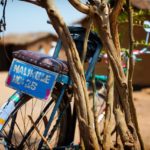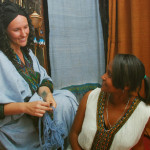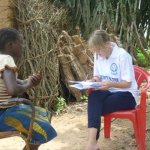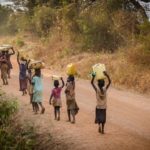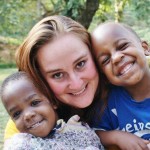On Volunteering with Orphans in Lesotho

I followed the women in front of me, a tub full of dirty clothes on my head, my hands there to steady the tub. As I walked, one shirt fell onto the path in front of me and then another one. Embarrassed, I stopped to pick them up. No one else was dropping clothes, not even my daughter who walked with a tub on her head just in front of me.
Working with World Vision and community volunteers, we were carrying the filthy clothes of four young orphans living on their own in a hut in a small village near the town of Butha Buthe, Lesotho. We were Americans with different customs, different talents and different skills. I learned quickly that carrying heavy objects on my head is definitely not one of mine.
Visiting the 13-year old girl my family has sponsored through World Vision was the primary reason for our visit to the impoverished country of Lesotho, where AIDS and child abuse are common. Doing what we could to help the community while we were there was our second. After months of coordinating with World Vision, gaining security clearance and permission from our sponsored child’s family, we crossed the border from South Africa into Lesotho. Julius, our World Vision contact, met us at the border and became our tour guide and translator for our Lesotho stay.
We were Americans with different customs, different talents and different skills. I learned quickly that carrying heavy objects on my head is definitely not one of mine.
We picked out Nthabeleng from her classmates at her school before meeting her family in her small village of red dirt, round thatched roof huts, and square brick buildings. As we opened the car doors, we were welcomed by the sound of shrill trills, high pitched tongue rolling and singing.
The people of her village escorted us to a table set with their finest, where we sat and ate and feasted on roasted chicken, Nyekoe (sorghum, pumpkin, and beans), carrots with beans and curry spices, boiled pumpkin, samp (similar to polenta), lentils, lipabi (ground roasted corn), motoho (a traditional porridge made from sorghum, similar to apple sauce in texture and in sweetness), dried peaches, and bread.
As we ate, women dressed in blue and white rolled and shrugged their shoulders and danced, while others sang to the beat of a drum, the mountains a dramatic backdrop behind us. We met Nthabeleng’s family and exchanged gifts while at least 70 villagers of all ages looked on.
We spent the next day cleaning the home of the four orphaned children, their clothes and the land around them. Because of the cold, we didn’t meet the other volunteers until 11 a.m. when the land was warmed by the sun. Outside, the children’s hut was surrounded by trash. Inside the brick rondavel, with its straw roof and dung floor, contained a shelf, a trunk for clothes and a twin bed with a rusty frame and broken springs.
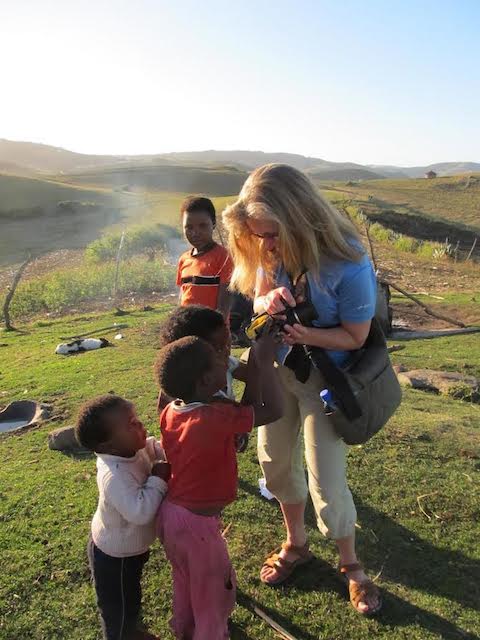
Washing Clothes by the River: Volunteering with Orphans in Lesotho
My husband cut and gathered fire wood. My children and I picked up trash. My husband and son washed dishes and cleaned the hut’s soot-covered ceiling while my daughter and I washed the children’s clothes.
I followed the women down the path to the river and watched as they emptied the clothes on the rocks, filled their tubs with water and added powdered soap before scouring the children’s clothes. We scrubbed and scrubbed, squatting and kneeling on the rocks, the sun warm but the air cool, our hands immersed in the cold river water.
As we washed, the women around us talked and laughed in a language we didn’t understand. My daughter watched closely and mimicked them, learning quickly how they scrubbed without splashing. I cleaned the only way I knew how, hands holding the cloth together, rubbing in an even rhythm.
When a woman filled my tub with fresh water, I remembered the one Sethotho word I had learned. “Galiboha,” I said. “Thank you.”
With eyes big and intent, she responded, “Galibo-HA,” accenting the last syllable. I tried again, “Galibo-HA!” I said, loud and clear. She laughed and laughed, and the other women laughed with her. She pointed to my daughter. “Better than you!” she said and laughed again, showing me how they scrubbed the red dirt from their clothes, two short scrubs ending with one long stroke.
Clean clothes lay on the rocks drying in the sun.
I smiled and tried to copy their ways, moving my hands together as if I was making music with sandpaper blocks.
The women continued to talk in the language of Lesotho, but now we all laughed easily. The brown shirts turned pink and blue and yellow, the wash tubs’ once clear water now the color of dirt. Clean clothes lay on the rocks drying in the sun.

When our job was done, we gathered together inside the hut where World Vision supplied the children with new school uniforms, two new mattresses, four comforters, eggs, beans, sacks of maize, and a lock for the door. As the 30 or so community workers gathered in the hut, they sang to the children.
One of the World Vision workers wiped away a tear as she lectured to the group, telling them in their language that it is the responsibility of everyone in the community to look after and take care for the orphaned children and reminded them that they would want the community to take care of their children if they died.
Back home, I scrutinized the photographs. No wonder clothes kept falling from my tub onto the path in front and behind me. My tub was piled higher than anyone else’s as we walked down to the river.




